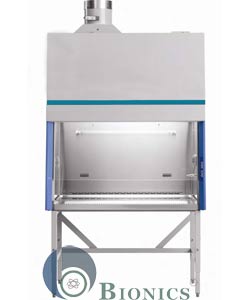Don't Fall to Biosafety Cabinets Blindly, Read This Article
Don't Fall to Biosafety Cabinets Blindly, Read This Article
Blog Article
Class 2 Biosafety Cabinets: Essential Equipment for Laboratory Safety and Microbiological Containment

In today’s scientific and clinical labs, safety for personnel and samples is non-negotiable. Whether it's biotech development, pharmaceutical research, or microbiological analysis, biosafety cabinets form the backbone of contamination control.
Of all types, Class 2 cabinets are most commonly used due to their efficiency and versatility. These units are crucial for working with moderate-risk organisms and sensitive samples.
Understanding Biosafety Cabinets
Biosafety cabinets are airflow-controlled workspaces engineered for microbiological safety. They use HEPA filtration to remove contaminants from incoming and outgoing air.
These units are generally classified into three main types: Class I, II, and III based on containment level. Among these, Class 2 cabinets are the most versatile and commonly used.
What Are Class 2 Biosafety Cabinets?
Class 2 Biosafety Cabinets ensure safety on all fronts—personnel, workspace, and biological material. They direct filtered airflow in a laminar pattern over the work surface.
Both incoming and outgoing air are HEPA-filtered to maintain sterility and prevent leaks. These cabinets are suited for clinical, research, and pharmaceutical lab applications.
Essential Features of Class 2 Safety Cabinets
A Class 2 microbiological safety cabinet includes several critical technologies such as:
• High-efficiency air filters to ensure clean workspace air
• Uniform downward airflow to protect the sample zone
• Negative pressure barriers to prevent leakage
• Built-in UV sterilisation for decontaminating surfaces
• Quiet operation and ergonomic design for user comfort
• Front glass for full control and protection
These elements support lab workers in maintaining sterile working environments.
Where Class 2 Cabinets Are Used
Class 2 Biosafety Cabinets are widely deployed in clinical labs, vaccine R&D, and academic research. They are indispensable for handling clinical specimens, blood cultures, and biological reagents.
From universities to private pathology labs, Class 2 cabinets ensure lab hygiene and sample integrity.
Why Laboratories Prefer Class II Safety Cabinets
Using Class 2 cabinets offers numerous benefits for safety, accuracy, and lab hygiene:
• Prevents contamination during sensitive procedures
• Shields operators from Biosafety Cabinets harmful aerosols and pathogens
• Minimises lab contamination and pollution risks
These cabinets combine safety features with operational efficiency.
Design and Compliance Standards
Top manufacturers design units compliant with major biosafety regulations worldwide. Class 2 units are sub-classified as A1, A2, B1, and B2—each with distinct airflow and exhaust features.
• Type A2: Recirculates 70% and exhausts 30% of filtered air
• Type B2: Used for hazardous vapors and chemicals
Matching the cabinet type to your process is essential.
Choosing the Right Biosafety Cabinet
Before purchasing, consider:
• Your application type (e.g., diagnostics, pharma, research)
• Cabinet dimensions, ducting needs, and room layout
• Ease of use, energy efficiency, and upkeep
• Warranty, training, and certification services
Working with reliable manufacturers provides peace of mind and technical guidance.
Best Practices for Using Class II Biosafety Cabinets
For optimal results:
• Minimise airflow interference during operation
• Schedule regular performance checks
• Educate staff on cabinet operations and safety
Operational best practices include:
• Use gloves, gowns, and face shields while operating
• Avoid sudden or quick arm movements
• Decontaminate surfaces before and after use
• Use UV lights only when cabinet is off and unoccupied
Why Class 2 Cabinets Are a Must-Have in Labs
Class 2 biosafety cabinets are vital equipment in laboratories dealing with biohazards. They ensure contamination-free experiments and personnel safety.
From biotech and diagnostics to academia and pharma, Class II cabinets copyright the highest biosafety levels. When investing in a biosafety cabinet, choose performance and reliability over cost-cutting—because lab safety is non-negotiable. Report this page